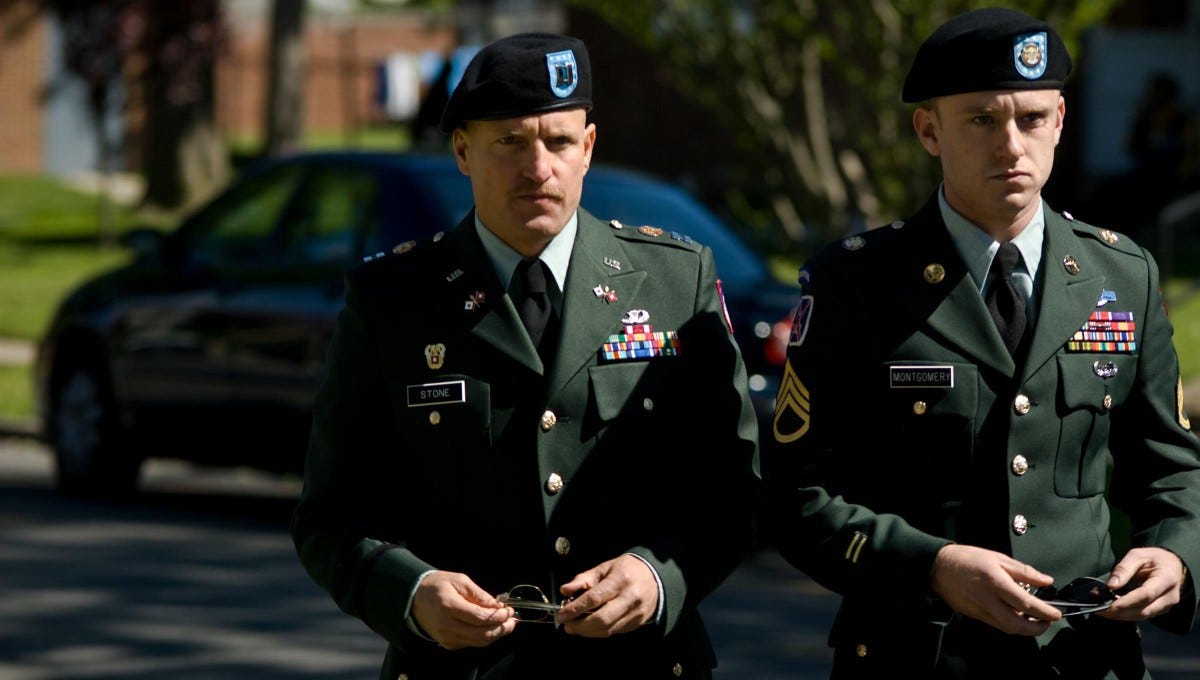My First Film Review: The Messenger (2010)
The first review I was ever paid to write (City Arts Magazine, Seattle).
I was looking forward to The Messenger, having heard it was a tightly-wound, well-acted picture that told an important story (all these claims are true, by the way) but, when I reached the theatre door and saw the film’s poster, my blood froze. Right there under the stalwart names Ben Foster, Woody Harrelson and Samantha Morton I was the words “Jena Malone” and fell into a terrible flashback of her epically bad voiceovers that made Into the Wild unbearable. But, in the not-yet-heard words of Harrelson’s Cpt. Tony Stone, I grabbed a “double-handful of balls” and sat down inside.
Lo and behold, as soon as Sgt. Will Montgomery focuses his damaged eye, she appears. Malone’s Kelly has a crimped Cleopatra haircut and we quickly understand how Montgomery could have emotional problems—she is what the kids call a “friend with benefits.” After a quick segue to said benefits, Malone fades to the background and the film really begins.
For the last three months of his tour, Montgomery is assigned to work with Stone on “bereavement notification” missions. The babyfaced Foster and blockheaded Harrelson share a great first scene together, which both parties eating five words for every one that comes out (I’m going to guess that Woody now owns an award for “Most Aggressive Watermelon Eating on Film”).
The first time the pair heads to a door to notify the next of kin for a dead soldier, director Oren Moverman shifts to a handheld camera shot from behind Montgomery and Stone. Variations on this bumpy, unsettling scene recur throughout the film—the viewer is a shaken third party on all these trips. At first I felt sympathy for the protagonists as they are slapped and spit on but as the bereavement notifications piled up I the actions of the parents, wives and husbands of the dead soldiers felt more and more natural.
The most neutral reaction comes from Olivia, played by the always-beguiling Samantha Morton. She floats through the film with a distracted numbness, one earbud often hanging down her chest. Some of her dialogue highlights the only problem I had with the film—it tries to do too much at times. In a crucial scene, she explains to Montgomery that one of her husband’s shirts “smelled of rage,” which feels like a metaphor beyond her character. But she closes her speech with the much more realistic detail that she wants to leave and pick up her son early from school because he loves it, which is one of the small, touching details that power The Messenger.
Still, the more interesting relationship is between the two veterans, who look great together slamming beers and displaying profane army tattoos under white tank tops. The more verbose Stone picks Montgomery so raw it seems cruel but it’s only from that place that the younger man can share the revelation we’ve been waiting for all film. Moverman mostly shows the men in obscure darkness or bright light, so that we squint along with the beleaguered characters.
In a contest of brutishness, the more human Harrelson (preening his eyebrows with a fork) probably deserves the Supporting Actor Oscar over Christopher Waltz’ showier, mincing Nazi in Inglourious Basterds, though the hype for the latter rivals that of Heath Ledger’s ghost.
The Messenger does a most difficult job—taking deaths away from the heroism of the battlefield and laying them at the feet of American families.




